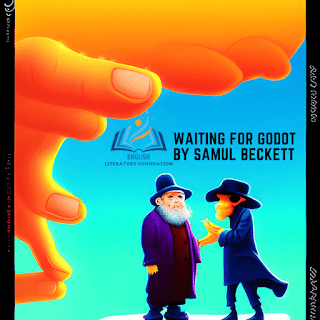Waiting for Godot: A Masterpiece of Existentialist Theater
"Waiting for Godot" is a play written by Samuel
Beckett that has become a classic of modern theater. It was first performed in
Paris in 1953 and has since been staged all over the world, gaining a reputation
as one of the most important works of 20th-century literature. In this article,
we will examine the play's plot, characters, themes, symbols, and philosophical
implications, as well as its reception and impact on literature and culture.
Analysis of the Play
The Plot
"Waiting for Godot" tells the story of two tramps,
Vladimir and Estragon, who are waiting for someone named Godot. They pass the
time by engaging in nonsensical conversations, playing games, and interacting
with two other characters, Pozzo and Lucky. Despite their anticipation, Godot
never arrives, leaving the tramps to question the meaning of their existence
and the purpose of their waiting.
The Setting
The play is set on a barren landscape with a single tree,
suggesting a post-apocalyptic world. The lack of action and the monotony of
waiting create a sense of emptiness and despair, emphasizing the bleakness of
the human condition.
The Characters
The characters in "Waiting for Godot" are complex
and multifaceted. Vladimir and Estragon represent the struggle to find meaning
in a meaningless world. Pozzo and Lucky represent the forces of power and
oppression that shape our lives. Godot himself is an enigma, representing both
hope and futility.
The Themes
The play deals with a number of existentialist themes, such
as the search for meaning, the absurdity of existence, the inevitability of
death, and the struggle to maintain human dignity in the face of adversity. It
also touches on broader themes, such as the relationship between power and
oppression, the nature of friendship and love, and the role of art in society.
The Symbols
"Waiting for Godot" is filled with symbols that
add depth and complexity to the play. The tree represents the cycle of life and
death, the rope represents the bonds that tie us to our fate, and the boots
represent the need for protection and security. Even the title itself is
symbolic, suggesting that we are all waiting for something that may never
arrive.
Interpretation
The Meaning of the Play
"Waiting for Godot" is a play that resists easy
interpretation. Some critics see it as a commentary on the futility of human
existence, while others see it as a celebration of the human spirit in the face
of adversity. Some see it as a critique of modern society, while others see it
as a reflection of the human condition throughout history. Ultimately, the
play's meaning is left to the interpretation of the audience.
The Existentialist Philosophy
The play is often seen as an embodiment of the philosophy of
existentialism, which emphasizes the freedom and responsibility of the
individual in a world that lacks inherent meaning or purpose. Vladimir and
Estragon's endless waiting and search for meaning reflect the existentialist
struggle to find purpose in an absurd and meaningless world.
The Impact on Literature and Culture
"Waiting for Godot" has had a profound impact on
literature and culture since its debut. It has been praised for its innovative
use of language, its exploration of existential themes, and its deconstruction
of traditional theatrical forms. The play has influenced generations of writers
and artists, from Harold Pinter and Tom Stoppard to David Lynch and Monty
Python.
Reception
Reviews of the Play
The play's initial reception was mixed, with some critics
praising its innovation and others criticizing its perceived obscurity and lack
of narrative structure. However, as the play gained popularity, it began to be
recognized as a groundbreaking work of theater. Today, it is widely regarded as
one of the most important plays of the 20th century.
Awards and Honors
"Waiting for Godot" has won numerous awards and
honors, including the Obie Award, the New York Drama Critics' Circle Award, and
the Tony Award for Best Revival of a Play. It has also been translated into
dozens of languages and performed all over the world, cementing its status as a
cultural landmark.
Adaptations in Other Media
The play has also been adapted into various other media,
including film, television, and radio. Notable adaptations include the 2001
film "Waiting for Godot" starring Sir Ian McKellen and Patrick
Stewart, and the 1987 BBC television production starring Sir Ian McKellen and
Ronald Pickup.
Conclusion
"Waiting for Godot" is a masterpiece of modern
theater that continues to captivate audiences and inspire artists around the
world. Through its complex characters, innovative use of language, and
exploration of existentialist themes, the play challenges us to confront the
fundamental questions of human existence. Its impact on literature and culture
is undeniable, making it a must-see for anyone interested in the arts.
FAQs
- Who is
Samuel Beckett?
- Samuel
Beckett was an Irish playwright, novelist, and poet who is widely regarded
as one of the most important writers of the 20th century.
- What
is the plot of "Waiting for Godot"?
- "Waiting
for Godot" tells the story of two tramps who are waiting for someone
named Godot. Despite their anticipation, Godot never arrives, leaving the
tramps to question the meaning of their existence and the purpose of their
waiting.
- What
is the meaning of the play?
- The
meaning of "Waiting for Godot" is left to the interpretation of
the audience, but it is often seen as a commentary on the futility of
human existence and the struggle to find meaning in an absurd and
meaningless world.
- Why is
"Waiting for Godot" important in literature?
- "Waiting
for Godot" is important in literature because of its innovative use
of language, its exploration of existential themes, and its deconstruction
of traditional theatrical forms. It has influenced generations of writers
and artists and is widely regarded as one of the most important plays of
the 20th century.
- Are
there any adaptations of the play in other media?
- Yes,
"Waiting for Godot" has been adapted into various other media,
including film, television, and radio. Notable adaptations include the
2001 film "Waiting for Godot" starring Sir Ian McKellen and
Patrick Stewart, and the 1987 BBC television production starring Sir Ian
McKellen and Ronald Pickup.

